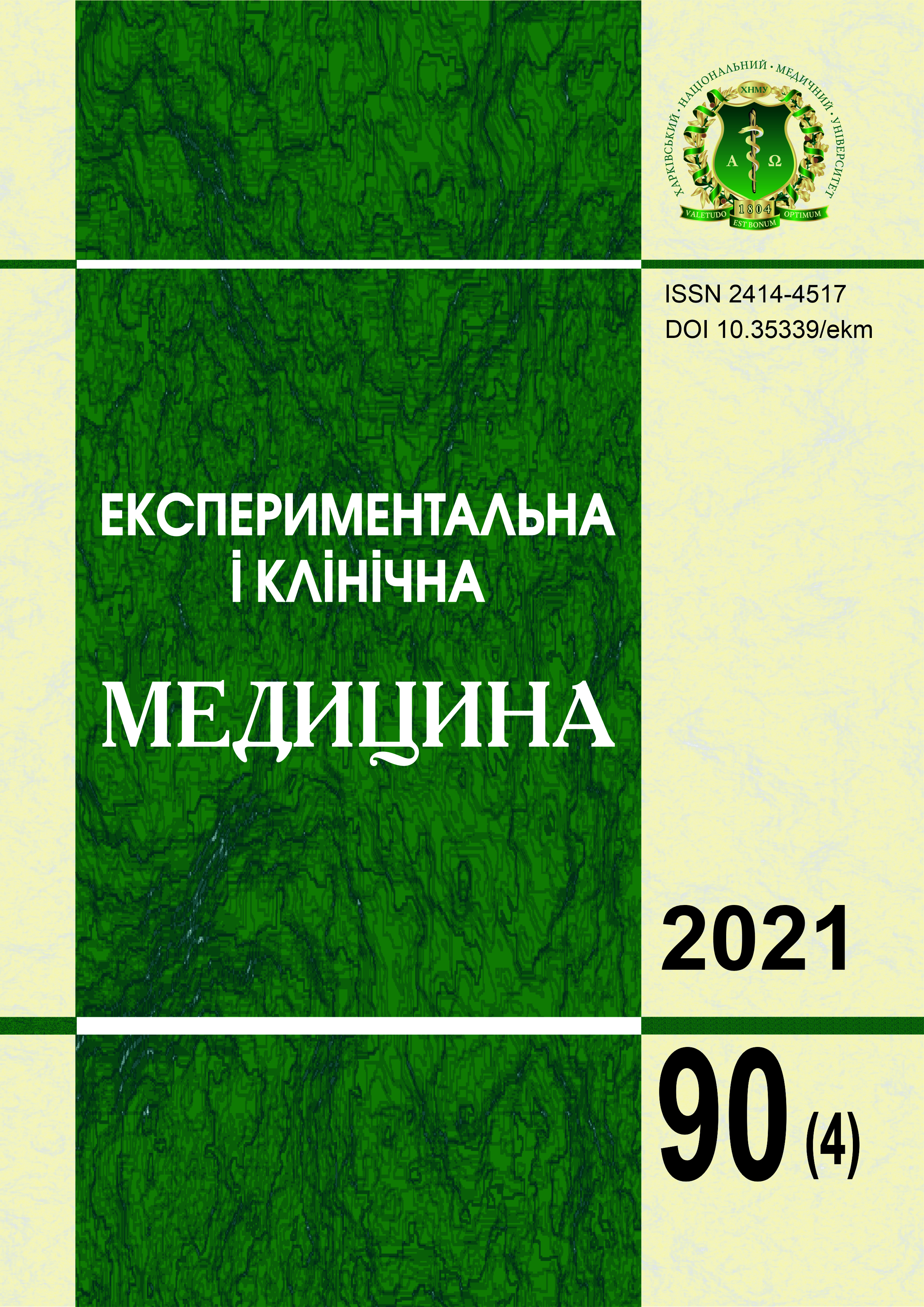Abstract
The aim of the study was to determine the prevalence of the main groups of Risk Factors (RF) for the development of Brain Strokes (BS) among the adult population. 500 patients aged 19–91, who received rehabilitation measures on the basis of the clinical sanatorium "Roshcha" and "Bereziv Mineral Water Resort", were examined. Two groups were formed: the Main Group (MG), which included 300 patients, and the Control Group (CG), which included 200 patients. The average age of patients in MG was (56.66±9.90) years, in CG persons – (57.16±10.79) years. All patients signed the informed consent. The research was conducted by the questionnaire method. For this purpose, the author's questionnaire was used to establish RFs of BS development. When conducting a medical-statistical analysis of the calculations were carried out using non-parametric medical and statistical methods. The probability of differences was determined using the Mann-Whitney U-test. The threshold value of the level of probability of all calculated features was taken as 0.05 (p=0.05). When conducting research significant eating behavior disorders among MG persons were reliably determined, which were characterized by significant and excessive consumption of food and non-compliance with the diet. It is probable that a significant percentage of MG persons with the presence of stressful situations were noted, which were noted every day (20.0%) or 1–2 times a week (21.3%) or less often (36.3%). The presence of probable prevalence of deterioration of well-being due to changes in weather conditions among persons MG with probably significant drops in blood pressure. The presence of probable sleep problems was determined. Thus, the most significant RFs of BS development were determined, which were grouped into five groups: medical-biological uncontrolled, medical-biological controlled, medical-social, psychological and climatic with a daily regime.
Keywords: medico-biological risk factors, medico-social risk factors, psychological risk factors, climatic risk factors.
References
Noncommunicable diseases. WHO, 2018. [Internet]. Available at: https://www.who.int/en/news-room/fact-sheets/detail/noncommunicable-diseases [accessed 20 Dec 2021].
10 leading causes of death in the world. WHO, 2018. [Internet]. Available at: https://www.who.int/en/news-room/fact-sheets/detail/the-top-10-causes-of-death [accessed 20 Dec 2021].
Mishchenko TS, Chemer NM, Moskovko SP, Huk AP, Shulha OD, Flomin YuV, and others Assessment of the quality of stroke care in hospitals according to the data of the RES-Q registry. International neurological journal. 2020;16(1):10-6. DOI: 10.22141/2224-0713.16.1.2020.197325. [In Ukrainian].
Feigin VL. Anthology of stroke epidemiology in the 20-th and 21-st centuries: Assessing the past, the present, and envisioning the future. International J. of Stroke. 2019;14(3):223-37. DOI: 10.1177/1747493019832996. PMID: 30794102.
Saliba LJ, Maffett S. Hypertensive Heart Disease and Obesity: A Review. Heart Fail Clin. 2019;15(4):509-17. DOI: 10.1016/j.hfc.2019.06.003. PMID: 31472886.
Piche ME, Tchernof A, Després JP. Obesity Phenotypes, Diabetes, and Cardiovascular Diseases. Circ Res. 2020;126(11):1477-500. DOI: 10.1161/CIRCRESAHA.120.316101. PMID: 32437302.
Rychter AM, Ratajczak AE, Zawada A, Dobrowolska A, Krela-Kazmierczak I. Non-Systematic Review of Diet and Nutritional Risk Factors of Cardiovascular Disease in Obesity. Nutrients. 2020;12(3):814. DOI: 10.3390/nu12030814. PMID: 32204478.
Adair T, Lopez AD. The role of overweight and obesity in adverse cardiovascular disease mortality trends: an analysis of multiple cause of death data from Australia and the USA. BMC Med. 2020;18(1):199. DOI: 10.1186/s12916-020-01666-y. PMID: 32746822.
Johnson W, Onuma O, Owolabi M, Sachdev S. Stroke: a global response is needed. Bull. World Health Organ. 2016;94:634a. DOI: 10.2471/BLT.16.181636. PMID: 27708464.
Norrving B, Barrick J, Davalos A, Dichgans M, Cordonnier C, Guekht A, et al. Action Plan for Stroke in Europe 2018–2030. Eur Stroke J. 2018;3(4):309-36. DOI: 10.1177/239698731880871913. PMID: 31236480.
Feigin V, Norrving B, Sudlow CLM, Sacco RL. Updated Criteria for Population-Based Stroke and Transient Ischemic Attack Incidence Studies for the 21st Century. Stroke. 2018;49(9):2248-55. DOI: 10.1161/STROKEAHA.118.022161. PMID: 30355005.
WHO Selected adult risk factor trends. 2019. [Internet]. Available at: https://www.who.int/nmh/countries/ukr_en.pdf [accessed 20 Dec 2021].
Zhao M, Wang X, He M, Qin X, Tang G, Huo Y et al. Homocysteine and Stroke Risk: Modifying Effect of Methylenetetrahydrofolate Reductase C677T Polymorphism and Folic Acid Intervention. Stroke. 2017;48(5):1183-90. DOI: 10.1161/STROKEAHA.116.015324. PMID: 28360116.
Hauer AJ, Ruigrok YM, Algra A, van Dijk EJ, Koudstaal PJ, Luijckx GJ, et al. Age-Specific Vascular Risk Factor Profiles According to Stroke Subtype. J Am Heart Assoc. 2017;8;6(5):e005090. DOI: 10.1161/JAHA.116.005090. PMID: 28483775.
Howard VJ, Madsen TE, Kleindorfer DO, Judd SE, Rhodes JD, Soliman EZ, et al. Sex and Race Differences in the Association of Incident Ischemic Stroke With Risk Factors. JAMA Neurol. 2019;76(2):179-86. DOI: 10.1001/jamaneurol.2018.3862. PMID: 30535250.
Chen N, Li Y, Fang J, Lu Q, He L. Risk factors for malnutrition in stroke patients: A meta-analysis. Clin Nutr. 2019;38(1):127-35. DOI: 10.1016/j.clnu.2017.12.014. PMID: 29310894.
Madsen TE, Howard G, Kleindorfer DO, Furie KL, Oparil S, Manson JE, et al. Sex Differences in Hypertension and Stroke Risk in the REGARDS Study: A Longitudinal Cohort Study. Hypertension. 2019;74(4):749-55. DOI: 10.1161/HYPERTENSIONAHA.119.12729. PMID: 31405299.

